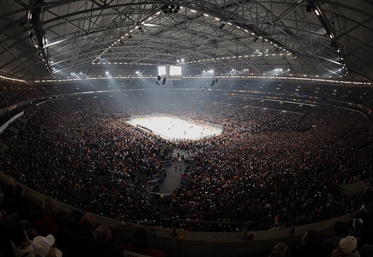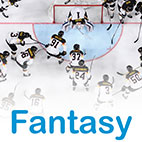Home-town heroes
Home-town heroes
When host nations spring surprises

 Like in 2017, Germany got an opening-day victory against the United States in 2010. That game was played in the football stadium of Schalke 04 in Gelsenkirchen before a crowd that set a world record. Photo: Matthew Manor / HHOF-IIHF Images
Like in 2017, Germany got an opening-day victory against the United States in 2010. That game was played in the football stadium of Schalke 04 in Gelsenkirchen before a crowd that set a world record. Photo: Matthew Manor / HHOF-IIHF Images
France is doing well in its hopes to get to the final round also thanks to a historic win against Finland to kick-start its campaign in Paris and Germany remains in the race for a top-four position in its group in Cologne.
It was not the first time an outsider has been inspired by a fervent home crowd and managed to upset the form book. Here’s a look at a few other big shocks in IIHF Championship play, starting with this year’s co-host.
Record crowd lifts Germany
Gelsenkirchen, Germany, 2010
Germany would have been relegated in 2009 had it not been preparing to host the following edition of the World Championship. The USA was fresh from an Olympic silver, albeit with a very different roster from the one that headed to Europe. The showpiece opening game of the 2010 Championship looked like a mismatch.
But it was destined to be a special day. First, the game was staged at the home stadium of Bundesliga football team Schalke 04, and the crowd of 77,803 set a new world record for a hockey game. To this day, it remains the biggest hockey crowd at an indoor venue – the Veltins-Arena roof is retractable, and was closed for this game – and the biggest at an IIHF Ice Hockey World Championship.
The raucous atmosphere was credited as a ‘seventh man’ for the Germans, with American players frustrated at the difficulty they faced in making themselves heard on the ice. Germany edged it 2-1 in overtime, backstopped by 31 saves from tournament MVP Dennis Endras and winning on a Felix Schutz strike 21 seconds into overtime. That kickstarted a run to the semi-finals for the host nation, its best result in the modern era. The USA, meanwhile, stumbled into a relegation round playoff where it survived with victories over Kazakhstan, France and Italy.
Swiss roll over Russia
Basle, Switzerland, 1998
Not for the first time, a shock home win involved some heroic goaltending. This time it was 20-year-old David Aebischer who caught the eye as a resilient Swiss roster withstood a big Russian comeback to win 4-2 in the qualification phase and reach its first semi-final since 1992.
Russia had been poised to march through the second group stage in Switzerland after a powerful performance saw the team rattle up the goals against Kazakhstan, Latvia and Finland. But that offence, was silenced by the Swiss for two periods. At the other end, goals from Marcel Jenni, Gian-Marco Crameri, Patrick Fischer - currently coaching the current Swiss team in Paris - and Michel Zeiter opened up a 4-0 lead by the 52nd minute. Viktor Kozlov and Oleg Petrov snatched two goals in a minute late on to set up an anxious finish, but the Swiss took the verdict and edged Russia out of contention for the medals.
Switzerland ultimately fell to Sweden in the semis, but Aebischer’s career was only just beginning. He moved to the NHL and became the first Swiss player to win a Stanley Cup, serving as reserve goalie for the Avalanche in 2001. The Swiss finally ended their medal drought with silver in 2013, 60 years after their previous medal run; the Russians would have to wait until 2008 to claim the gold they so desperately sought after the turbulence of the 1990s.
Stunning the Soviets
Katowice, Poland, 1976
When Poland hosted the 1976 edition, it wasn’t expected to make a big impact on the medal race. A hard-working but limited team had little prospect of success, especially when faced with an opening game against the all-conquering USSR.
On paper, it was a mis-match. The previous time the countries had met, at that year’s Winter Olympics, the Soviets had won 16-1. Viktor Tikhonov’s roster, boasting the talents of Kharlamov, Borisov, Tretiak and Yakushev, went on to take gold in that tournament before heading to Katowice to defend its World Championship. Poland, despite home ice advantage, was not expected to advance to the medal round.
Yet, the miracle happened. Mieczyslaw Jaskierski gave the Poles a 10th-minute lead; the Podhale Nowy Targ man got a second later in the game. A hat-trick for Wieslaw Jobczyk helped the host jump to a 5-2 lead in the second period. Ultimately, Poland held on to win 6-4 – arguably the biggest shock in IIHF Ice Hockey World Championship history.
It didn’t inspire a Polish medal run, though. The next day saw a 12-0 loss against Czechoslovakia, the eventual gold medalist. The Soviets took silver, Poland finished in seventh out of eight team overall and was ultimately relegated to make room for Canada’s return to the competition in 1977.
The early years
Stockholm and Vienna
International ice hockey before World War II was a very different beast. Reliable records are harder to come by, and it’s far from easy to assess the relative strengths of the competing teams. But a couple of results stand out from those times.
In 1921 the European Championship, as contested by IIHF-affiliated teams, resumed after a hiatus caused by the First World War. Stockholm was the host city, Sweden was scheduled to take on Czechoslovakia in a single game to determine the title. The Czechs, representing a new nation, took over the mantle of Bohemia, a regular contender before the war. Sweden was taking part for the first time – and delivered an emphatic 7-3 victory to lift its first international title. Erik Burman and Georg Johansson-Brandius scored three apiece, Einar Lundell got the other.
Then came 1930, and the first stand-alone World Championship. Canada, represented by the Toronto CCMS, an amateur club team, had a bye to the final where it duly beat Germany 6-1 in Berlin. But the lead-up to the game included a Feb. 7 exhibition game against Austria in Vienna. Sensationally, Austria won it 1-0 to inflict Canada’s first ever defeat against European opposition. Click here to read more about that tournament.
Back to Overview
































































































